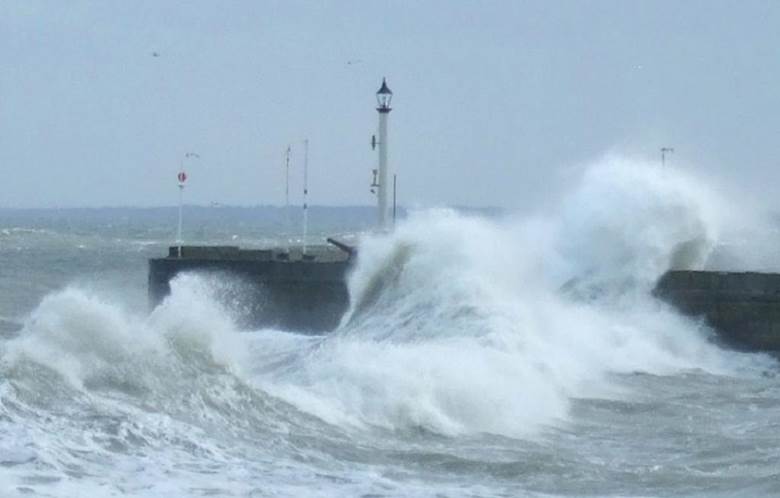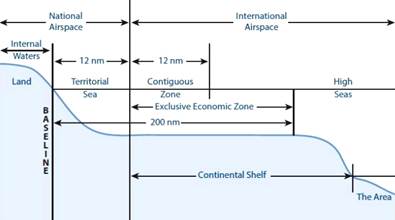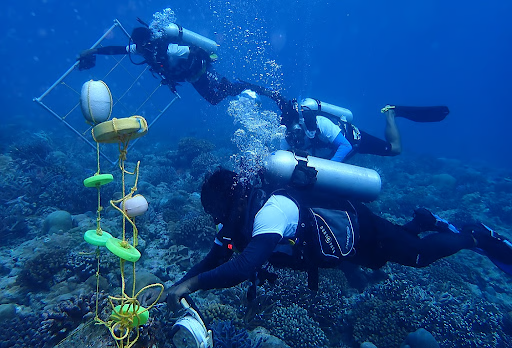Description

Copyright infringement is not intended
Context: United Nations member states have gathered in New York to create a new, legally-binding global treaty to govern the use of the high seas. This could be the last round of negotiations for the conservation and sustainable use of marine biological diversity.

Details:
- The treaty will help conserve biodiversity in areas beyond national jurisdiction (BBNJ) that lie outside countries’ 322-kilometre exclusive economic zones.
- Scientific information over the past decade has revealed the richness and vulnerability of marine biodiversity, particularly around seamounts, hydrothermal vents, sponges, and cold-water corals.
- However, there are several concerns about the increasing anthropogenic pressures posed by existing and emerging activities, such as fishing, mining, marine pollution, and bioprospecting in the deep sea.
- The Intergovernmental Conference of the UN began on August 15, 2022, and will go on till August 26. This is the fifth round of negotiations on the international instrument under the UN Convention on the Law of the Sea (UNCLOS).
- The UN general assembly had decided to convene an Intergovernmental Conference (IGC) in December 2017 to elaborate on the text of the legal instrument for protecting BBNJ under UNCLOS.
- The IGC held four formal sessions in September 2018, March 2019, August 2019 and March 2022. The sessions were postponed due to COVID-19 restrictions.
- Now, the revised draft of the text is being negotiated upon at the meeting.
- The discussions will focus on the marine genetic resources, including issues on sharing benefits, measures such as area-based management tools of marine protected areas, environmental impact assessments, capacity-building and the transfer of marine technology, as well as cost-cutting issues.
- UNCLOS was adopted in 1982 and laid the foundation of ocean governance, with the first single set of rules for oceans and seas. On April 29 2022, the UN Convention on the Law of the Sea (UNCLOS) completed 40 years.
- There are two more instruments under the Convention: The 1994 agreement on the implementation of Part XI of UNCLOS and the 1995 UN Fish Stocks Agreement.
- The treaty on BBNJ will be the third legal instrument under the convention.
- Marine genetic resources and the issue of benefit-sharing are among the major elements of the draft negotiating text and were discussed in parallel sessions on August 16, 2022
UNCLOS:
Maritime Zones

- Baseline: It is the low-water line along the coast as officially recognized by the coastal state.
- Internal Waters: Internal waters are waters on the landward side of the baselinefrom which the breadth of the territorial sea is measured. Each coastal state has full sovereignty over its internal waters as like its land territory. There is no right of innocent passage through internal waters.
- Territorial Sea: The territorial seaextends seaward up to 12 nautical miles (nm) from its baselines. The coastal states have sovereignty and jurisdiction over the territorial sea. These rights extend not only on the surface but also to the seabed, subsoil, and even airspace. But the coastal states’ rights are limited by the innocent passage through the territorial sea.
- Contiguous Zone: The contiguous zoneextends seaward up to 24 nm from its baselines. The coastal state has the right to both prevent and punish infringement of fiscal, immigration, sanitary, and customs laws within its territory and territorial sea. Unlike the territorial sea, the contiguous zone only gives jurisdiction to a state on the ocean’s surface and floor. It does not provide air and space rights.
- Exclusive Economic Zone (EEZ): Each coastal State may claim an EEZ beyond and adjacent to its territorial sea that extends seawardup to 200 nm from its baselines. Unlike the territorial sea and the contiguous zone, the EEZ only allows for the above-mentioned resource rights. It does not give a coastal state the right to prohibit or limit freedom of navigation or overflight, subject to very limited exceptions.
- High Seas: It is considered as “the common heritage of all mankind”and is beyond any national jurisdiction.
https://www.downtoearth.org.in/news/environment/un-meet-begins-over-treaty-to-govern-use-of-high-seas-84367












